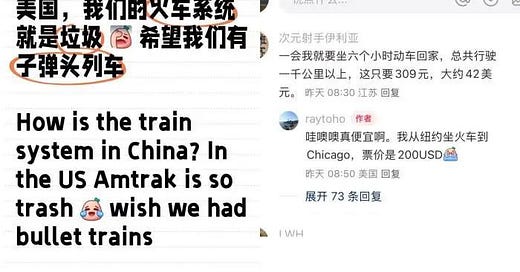Growth Dragons Weekly: Americans and Chinese Connect on Xiaohongshu, Vivo and Huawei Surpass Apple
What happened in China this week:
TikTok Ban Pushes Americans and Chinese to Interact on Xiaohongshu
Vivo and Huawei Overtake Apple in 2024 China Smartphone Shipments
China Meets 5% GDP Growth Target in 2024
Foxconn Deploys UBTech Humanoid Robots in Zhengzhou Factory
CTF Services: Steady Dividend with Potential Windfall From Toll Road Sale
#1 TikTok Ban Pushes Americans and Chinese to Interact on Xiaohongshu
The looming TikTok ban this weekend has dominated headlines, with U.S. courts upholding the ruling even as both the outgoing and incoming U.S. presidents attempt to reverse it.
This development is significant on multiple fronts.
The U.S., known for championing free speech and maintaining an open economy, has taken an unusual step in banning a specific app. This move echoes China's longstanding bans on American social media platforms like Facebook. However, the motivations differ: while China cited concerns over cultural influence, the U.S. cites national security risks as its primary concern in the case of TikTok.
This marks another instance of TikTok becoming a geopolitical pawn in the broader U.S.-China struggle. While such actions disrupt markets and investors, some may argue that economic and technological skirmishes are preferable to direct military conflicts, which come with far greater human costs.
President Trump, once a staunch adversary in the U.S.-China trade war, appears to be softening his approach. Notably, he has invited TikTok CEO Chew Shou Zi to his inauguration—an honor even some world leaders have not received. Trump also extended an invitation to Chinese President Xi Jinping, though Xi declined and sent a deputy instead. Additionally, Trump recently spoke to Xi on the phone about TikTok and other issues, signaling a potential willingness to engage more diplomatically in his second term.
This shift suggests that both sides may be exploring opportunities to ease tensions. While Trump initiated the trade war, his administration now seems more open to dialogue, perhaps recognizing the importance of a more balanced relationship with China.
One of the most unexpected outcomes of the TikTok ban is the migration of U.S. users to Xiaohongshu, a predominantly Chinese social media platform. The surge was so significant that Xiaohongshu became the most downloaded app on the U.S. App Store. These new users, often referred to as TikTok "refugees," are interacting with Chinese users on an unprecedented scale.
Despite Xiaohongshu's Chinese-language interface, English-speaking Americans have adapted quickly. Many are even using the platform as an opportunity to learn Chinese, while Chinese users post English language questions to seek help from their American counterparts.
This phenomenon is breaking barriers. Historically, American and Chinese citizens have had limited interaction on social media due to bans on American platforms in China and TikTok's separation from Douyin, its domestic equivalent. Now, on Xiaohongshu, users from both nations are engaging en masse, creating a rare opportunity to bridge cultural gaps. Americans may find their perceptions of China aren’t as negative as often portrayed in Western media, while Chinese users gain insights into American culture. These organic interactions bypass government and media narratives, fostering mutual understanding.
While this surge in cross-cultural interaction is encouraging, it remains to be seen whether it will persist. Some shareholders, including GGV Capital, GSR Ventures, and Tiantu Capital, are reportedly looking to sell their shares in Xiaohongshu at a $20 billion valuation, indicating uncertainties about its long-term prospects.
Regardless of what the future holds, one fact is clear: Chinese apps like Xiaohongshu have gained significant traction among American users, a scenario that would have been unimaginable a decade ago. This marks a notable shift in the global social media landscape and highlights the potential for deeper cultural exchange, even amidst geopolitical tensions.





